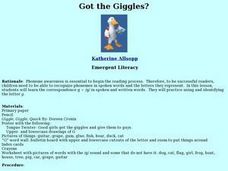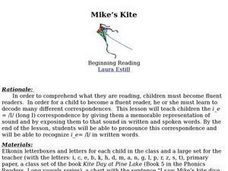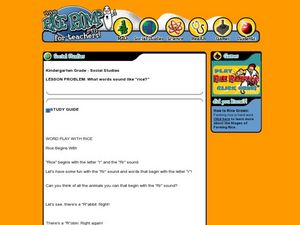Curated OER
Cracking Sticks
Students explore the letter /k/ in this lesson, and identify the /k/ sound in words. They read a tongue twister emphasizing the /k/ sound, and discuss that two letters make the /k/ sound - c and k. They then practice writing k's and...
Curated OER
Silly Siggy
Young scholars recognize the short /i/ sound in spoken and written words in this lesson. They say a tongue twister which emphasizes words with the short /i/ sound. They then listen to the book "Liz is Six" and identify the words in the...
Curated OER
Doct or Help! This /i/ is ITCHING!
Students recognize the short /i/ sound in written and spoken words. They say a tongue twister which emphasizes words with the short /i/ sound. They then listen to the story "Liz is Six" and identify the words in the story with the...
Curated OER
Doc Says Open Up
Students recognize the short /o/ sound in spoken words in this lesson. They say a tongue twister with words emphasizing the short /o/ sound. They then listen the the book "Hop on Pop" by Dr. Suess, and identify the words they hear...
Curated OER
Don't Make that Baby Cry
Pupils study the short "a" sound in words by examining the mouth movements made when making the sound. They practice making the sound by pretending they are making baby sounds. Next, they recite a tongue twister that contains a number of...
Curated OER
Simple Simon Saves the Day
Students recognize, identify, and locate the /s/ sound in spoken or written words. They say a tongue twister with words emphasizing the /s/ sound. They then listen to the story "Simple Simon" and make "finger snakes" whenever they hear...
Curated OER
SSSneaky SSSSnake
Students identify words that contain the s sound - comparing the sound to a hissing snake. They say a tongue twister with words emphasizing the s sound. They then practice writing s's, and listen for the s sounds in words the teacher...
Curated OER
Bee and Dee
Students practice discerning between the letters D and B. Through listening and writing activities, they recognize the difference between the commonly confused letters B and D. They practice writing both letters and correcting common...
Curated OER
Big, Bad, "B" and "D"
Students practice discerning between the letters D and B. Through hands on and listening activities, they recognize the difference between the commonly confused letters B and D. They practice writing both letters and correcting common...
Curated OER
Got the Giggles
Students identify the grapheme and phoneme for G. They practice writing the letter G and through listening activities, discriminate the phoneme /g/. They associate the phoneme /g/ with its letter representation and identify it in various...
Curated OER
Elmer the Elephant
First graders recognize the short vowel E in written and spoken language. Through matching activities, they discriminate the short vowel /e/ from other phonemes. Students associate the phoneme with its letter representation and spell...
Curated OER
Quirky Pink Pigs
Students study the letters 'p' and 'q' and recognize the difference between them. They practice listening for the /p/ and /kw/ sounds and engaging in activities that deal with the letters 'p' and 'q'. They also have the opportunity to...
Curated OER
Silly Sally
First graders identify the grapheme and phoneme for S. They practice writing the letter S and through listening activities, discriminate the phoneme /s/. They associate the phoneme /s/ with its letter representation and identify it as...
Curated OER
The Big Pig
Learners recognize the short vowel i in written and spoken language. Through matching activities, they discriminate the short vowel /i/ from other vowel sounds. Students associate the phoneme with its letter representation and identify...
Curated OER
It's Time to Open Wide for O
Students recognize the short vowel o in written and spoken language. Through listening and decoding activities, they discriminate the vowel sound /o/ from other phonemes. Students match the phoneme and letter in words they read on index...
Curated OER
Isabelle the Icky Iguana
Students practice the sound and spelling of the short vowel /i/. They identify the short /i/ sound in spoken and written words. The tongue twister "Isabelle iguana is in her igloo," and "Tin Man Fix It," along with Elkonin letter boxes...
Curated OER
Chuga, Chuga, Choo, Choo
Students identify the digraphs in written and spoken language. After a brief discussion on the combinations of letters that comprise digraphs, students practice identifying initial and final placement of the digraph /ch/ in words and...
Curated OER
G...G...Guzzle
Young scholars explore letters and their sounds. They practice making the /g/ sound. Students say tongue twisters with the /g/ sounds. They practice other activities with phonics.
Curated OER
The Squeaky Door
Young readers distinguish between the sounds for short vowel e and long vowel e. They are introduced to the vowel patterns that comprise long vowel sounds, with emphasis on /ea/. They practice reading and spelling a variety of words that...
Curated OER
Mike's Kite
Students explore the long /I/ sound as it is used in 'i_e' words. They recite a long /I/ tongue twister and use letterboxes to practice spelling 'i_e' words. In groups, they read a book with several long /I/ words and identify pictures...
Curated OER
Made You Mad
High schoolers explore the phoneme for the vowel-consonant-silent e grapheme. They recognize the silent "e" at the end of words and practice speaking them. Students say words, spell them, and say tongue twisters with the vowel...
Curated OER
What words sound like rice?
Learners experiment with sounds of words. In this word comparison instructional activity, students complete a series of games to assist them in hearing and sounding out the letters in the word rice. Learners use this information to...
Curated OER
Tricky T
Students practice the corresponding phonemes associated with the letter and sound symbol to T. They identify the letter, write it and also identify pictures that display it's beginning sound. Students also interact with the book,...
Curated OER
I'm Feeling Hot, Hot, Hot
Students recognize the phoneme /h/. Through listening and matching activities, students discriminate the phoneme /h/ from similar looking letters and phonemes. They associate the phoneme /h/ with its letter representation and identify...

























